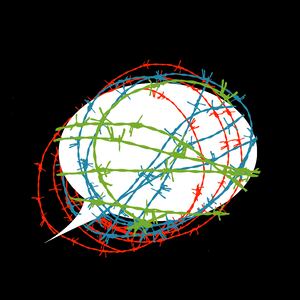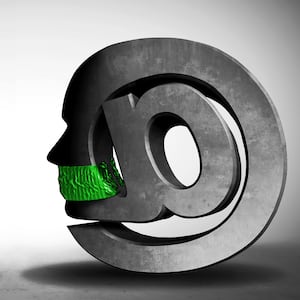The “antisemitism” goalposts just keep moving. And, while it may seem hard to believe, the right’s latest “antisemite” is an Oscar-winning Jewish filmmaker who made a movie about the Holocaust—and who said something that around two-thirds of American Jews believe.
Here are the offending remarks, made by filmmaker Jonathan Glazer, after his film, The Zone of Interest, won the Academy Award for Best International Feature Film for his film:
“Our film shows where dehumanization leads, at its worst. It shaped all of our past and present. Right now we stand here as men who refute their [sic] Jewishness and the Holocaust being hijacked by an occupation, which has led to conflict for so many innocent people. Whether the victims of October the 7th in Israel or the ongoing attack on Gaza, all the victims of this dehumanization. How do we resist?”
First, a quick gloss: It seems probable that Glazer meant to say something like “we stand here as men who refute having their Jewishness and the Holocaust being hijacked,” but got flustered in the moment. Glazer was visibly shaking during the remarks.
Some have claimed, I think preposterously, that Glazer literally meant “we stand here as men who refute their Jewishness.” But that makes no sense conceptually, has the wrong pronoun, and makes the rest of the sentence incoherent. (The misunderstanding may also be due to an early, truncated excerpt of the speech circulating online.) Glazer has not yet issued a clarifying statement.
Others in the Jewish community have condemned Glazer’s comments on a substantive basis. Michael Freund (a former adviser to Israeli Prime Minister Benjamin Netanyahu) posted on X that Glazer is “a self-hating Jew of the worst sort who exploits the Holocaust to attack Israel in public at the Oscars ceremony.” David Schaecter, the 94-year-old president of The Holocaust Survivor’s Foundation wrote to Glazer, “You should be ashamed of yourself for using Auschwitz to criticize Israel.” And the American Jewish Committee (AJC) called Glazer’s statement “an obscene distortion of Israel’s reality and a trivialization of the Holocaust.”
As of Tuesday morning, the speech was not on the Oscars’ YouTube page.

Jonathan Glazer accepts the award for Best International Feature Film for The Zone of Interest, flanked by James Wilson and Leonard Blavatni during the 96th Annual Academy Awards on Mar. 10, 2024.
Patrick T. Fallon / GettyIn fact, what Glazer said was not antisemitic, not anti-Zionist, and not even that left-wing.
It omitted the dogwhistles and shibboleths of the Left (colonialism, genocide, “from the river to the sea,” etc), and went out of its way to acknowledge both the Israeli victims of Oct. 7 and the Palestinian victims of the war. It was harsh, but even-handed and balanced. And it is accurate: defenders of Israel’s actions frequently invoke the Holocaust, antisemitism, and the often-tragic sweep of Jewish history to make their case.
Moreover, Glazer’s statement aligns with what nearly two-thirds of American Jews believe, according to a 2021 Pew survey: that a two-state solution is the right resolution to the conflict (63 percent), but that this Israeli government is not making a sincere effort toward peace (67 percent).
Are two-thirds of American Jews self-hating antisemites? Obviously not. What we are, are mainstream progressive and liberal Zionists. (I have articulated this view in my work since 2002, so I’ll use first-person pronouns here.)
We believe that Israel has a right to exist, even though the values of democracy and Jewish-specificity are intrinsically in tension with one another. And with that right to exist comes the right to defend itself and protect its security.

Jonathan Glazer and James Wilson at the 96th Annual Academy Awards on Mar. 10, 2024.
Richard Harbaugh / GettyBut we also believe that Israel has, many times and including in the present war, gone beyond what a state should do, ethically and strategically. It has fallen far short of democratic ideals in its discrimination against Arab citizens of Israel, and in the Israeli right’s 30 years-long undermining of the peace process. We oppose the military occupation of the West Bank and the apartheid-like regime there, where Israelis have civil rights but Palestinians do not; we support the creation of a viable, just Palestinian state; and, of late, we have called for an immediate bilateral ceasefire, in which Israel ends military operations in Gaza and Hamas releases the hostages it still holds.
In the context of the current conflict, a Dec. 21 press release from J Street, an American liberal-Zionist organization, well summarizes this position:
“We continue to affirm Israel’s right and obligation to defend its territory, provide security for its citizens and bring to justice those who perpetrated this barbaric attack. However, the civilian death toll and humanitarian crisis in Gaza that the Netanyahu government’s military operation have caused are unacceptable and out of line with American interests and values.”
This isn’t antisemitism. Nor is it rocket science; it’s what used to be the consensus reality in Washington, it is what at least 40 percent of Israeli Jews believe, and it is (still) official U.S. government policy.
Yes to Israel, no to the occupation, and no to the way this war has been conducted.
Admittedly, to many standing in solidarity with Palestine, this can all seem rather milquetoast.
On the other hand, to many in AIPAC and the pro-Israel community, it can seem like a betrayal of the Jewish people: these “milquetoast” positions have gotten me personally banned from Jewish events and conferences, and are regarded as treason by Israel’s far-right. I would also argue that this “milquetoast,” however unrealistic its vision may seem, offers the only path to a just and sustainable peace in Israel/Palestine. The maximalist visions of the Boycott Divest Sanction (BDS) movement on one side and the Israeli right on the other are either wishful thinking, or a brutal call for domination. Indeed, they are mirror images of one another.
In contrast, by going out of his way to acknowledge both the victims of Oct. 7 and the victims in Gaza, Glazer modeled the kind of multiple-narrative, multi-perspectival thinking that is so necessary in this conflict.
There is suffering on both sides; there are traumas on both sides; there are narratives of oppression on both sides. This doesn’t mean that everything everyone says is true, but acknowledging the presence of suffering on both sides (which, in my experience, few of those calling for a ceasefire on the left bother to do) is a step toward healing, and a step away from dehumanization.
Glazer’s immediate context is relevant, too. There have emerged, in the last century, two streams of Jewish responses to the Holocaust. One emphasizes the universal evils of genocide, dehumanization, and prejudice, and thus takes from the Holocaust the moral lesson that these evils must be combated everywhere. The other emphasizes the particular suffering of the Jewish people, and takes the moral lesson that Jews must be strong, must defend themselves, and must be ever watchful of antisemitism, which is an ever-present threat that will never go away.
This pessimistic view has lately been given voice by putative liberals like Franklin Foer and Dara Horn, but it necessarily slides to a right-wing ethno-nationalism. After all, if the world is always going to be trying to kill the Jews, we better do what we can to stop them. And if a few innocent civilians get in the way, well, that is the unfortunate price of Jewish survival.
Of course, both positions have some truth to it, which is why it is particularly offensive when anti-Israel protesters liken Israel to the Nazi regime. But Glazer is entirely correct that Jewishness and the Holocaust are frequently “hijacked” by those who defend Israel’s unjust treatment of Palestinians and Israeli Arabs.
To be sure, at times this is less a nefarious tactic than an instinctual reaction. Many Jews, myself included, feel the weight of the Holocaust in our bones. Our bodies keep the score: we feel the insecurity, and that fear can, at times, cause us to diminish of the humanity of others.
But we can refuse to be controlled by these primal fears. We can open ourselves to the suffering of others, and see in it the suffering our families also experienced. Instead of invoking the Holocaust to justify oppression, we see it as a basis to rise up and resist it.
This position is the opposite of antisemitism. It honors profound Jewish values that demand humanity, fairness, and peace, that justice must be pursued (Deut. 16:20), that how we treat the stranger is a profound moral test (Exod. 22:20), and that every human being reflects the image of the Divine.
Disagree with Jonathan Glazer if you like, but in daring to criticize Israel, he affirmed the deepest of Jewish values.







